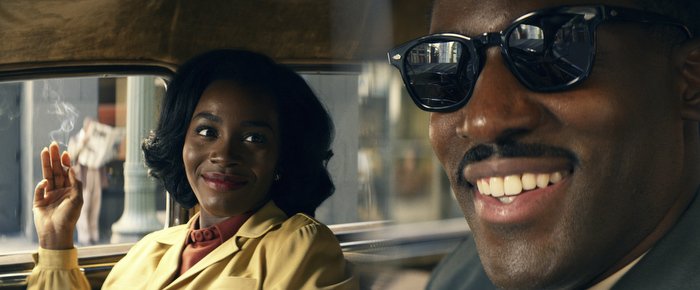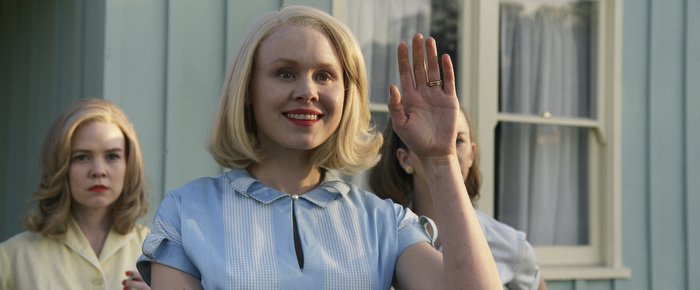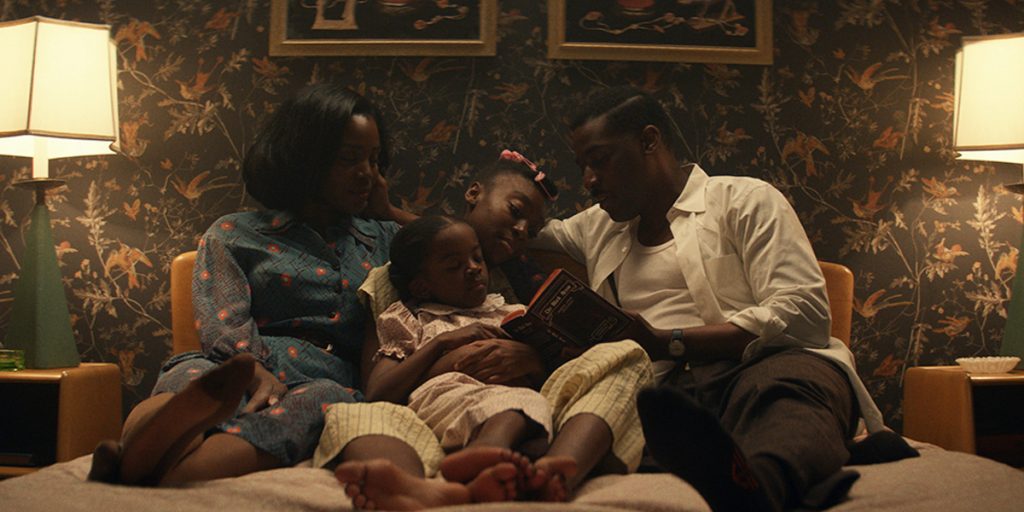Boasting strong and consistent themes as well as unique and compelling characterization, Them is another strong addition to socially conscious American horror.
I’m noticing a new movement in horror media that has really begun to pick up steam during the last five years or so; the real life horrors of American racism presented through the lens of cinematic horror. I’ve written about this trend a few times for Loud and Clear, including on films and shows such as Get Out, Antebellum, and Lovecraft Country. Personally, I like this movement toward socially conscious horror, so I was happy for the chance to review the first season of Them, created by Little Marvin. Before I delve too into the review, however, I first need to issue a big warning right off the bat: Them, and therefore my subsequent review, deals with graphic scenes of racial violence, sexual violence, and violence against children. It’s impossible to talk about this show without addressing these things, and I just wanted to give you all a fair warning.
Set in the mid-1950s, Them follows the Emory family: Lucky (Deborah Ayorinde) and Henry (Ashley Thomas), and their two daughters Ruby (Shahadi Wright Joseph) and Gracie (Melody Hurd). A black family originally from North Carolina, they move to an all-white neighborhood in Compton, just outside of Los Angeles. They quickly find themselves struggling to adjust to their new life as not only do their new white neighbors make it clear to the Emorys that they are unwelcome, but each of them are each pursued by past and present horrors haunting their every move.
Them’s greatest strength lies in its theming and symbolism, offering a unique and personalized horror experience for each family member. I don’t want to give away too much, but each family member is haunted by something specific to them and their adjustment to living in an overwhelmingly white space. For example, Henry’s spectre addresses his fear of becoming the caricature of blackness his white colleagues expect him to be, whereas Ruby’s focuses on her personal struggle with her black identity as she yearns for the acceptance and normalcy afforded to her white classmates due to their skin color. Through discovering each character’s greatest fears and anxieties in the face of past and present vicious racism at the hands of their white neighbors, we get a deep-dive into each character’s personal psyche.

Speaking of characters, Them also excels in its characterization. Bolstered by a strong cast, the show gets nuanced portraits of entire human beings, both for the protagonists and antagonists of the story. Don’t get me wrong, racism is still portrayed as unquestionably awful, but we also get small insights into how systems of power and privilege can creep into group-think, and manifest into some people who don’t even feel that strongly about having black neighbors committing atrocities simply through peer pressure and mob mentality; people who allow evil are just as much to blame as the people committing the evil.
Also – this is a little thing, but something I appreciated – I really liked how Henry was portrayed as a man who, though flawed, was also a loving and attentive father and husband. The trope/stereotype of the absent and/or deadbeat black father is tired and harmful, yet it still finds its way into a lot of the media I consume, so it was really great to see a positive example of black fatherhood and I hope to see more like it.
Them is also a very well-made show from a technical standpoint: the cinematography is beautiful, often utilizing long tracking shots – something I personally enjoy – with a diverse range of camera angles implemented to highlight visual motifs connected to different crucial plot points. The soundtrack also uses a varied range of timbres and themes to punctuate important story beats, as well as tense and frightening sequences. My personal favorite was in an episode that used eerie and dissonant a capella harmonies to highlight madness wrought through possession by deep-rooted bigotry.
While there is certainly plenty to like about Them – you’ve seen my score, I thought it was very good – it is not without some flaws. One is certain aspects with the writing: there are times when Them feels like it either bit off more than it could chew, or just simply made choices I thought were not the most effective it could have made. It is a show that follows a few different story and character arcs at once, but not all of them are resolved or concluded in a satisfying way. For example, Betty (Alison Pill) begins as one of the series’ central antagonists, acting as the neighborhood’s ringleader for harassing the Emorys. In the first two thirds of the season, she’s a great villain and Pill plays her very well. But then, in the later episodes, her part is reduced as she gets her own side plot. The events in this side plot may have been initially caused by her actions earlier in the season, but ends up feeling disconnected from the rest of the narrative, and could have reached a conclusion more in line with the central story.

Finally, there’s one more thing I need to discuss. Something deeply uncomfortable to talk about that I mentioned in the opening paragraph. So consider this your last warning, because going forward I’m going to be talking about some really dark subject matter, and will be delving into spoilers.
I liked most of this show. I found nine of the ten episodes to be really compelling for all of the right reasons. There’s one episode, however, that I think goes too far. It’s a flashback episode depicting a traumatic event before the Emory family move to California: while Henry and the girls are at the movies, a group of white people break into the Emorys’ home, rape Lucky, and murder Chester, the Emorys’ infant son. This sequence lasts for a third of the episode, and we see all of it happen. I can only speculate that this sequence’s goal was to be deeply upsetting and disturbing, and it certainly succeeds: it is, indeed, deeply upsetting.
This is something that could have been much better realized through suggestion or through quick clips interspersed throughout the season instead of the drawn out and graphic sequence we get. I’m not saying that traumatic things cannot be depicted on film: in the horror genre, you’d be hard pressed to find a film that doesn’t portray something that could be considered “traumatic.” I’m also not saying that things like this never happened in America in the 20th century: they absolutely did, and we should never let ourselves forget that. What I am saying is that this very long sequence could have been presented in other ways that would have been just as effective, and without being so graphic and brutal that it simply stopped being shocking and became border-line tasteless. Most of Them is great, but this episode left a really bad taste in my mouth.
I love media with something to say, and when they’re able to convey their message while still delivering a compelling and well-structured story, all the better. One the whole, Them is a net positive and a welcome addition to the expanding category of socially conscious horror. I do stand by my assertion that there’s one episode that goes too far and were I to rewatch the series I would skip it, but I wholeheartedly think that the rest of the series is worth seeing. Most of the time, it can be a difficult watch in a good way while still retaining its core story of a loving family doing their best.
Them is available to watch on Prime Video in select countries worldwide.

